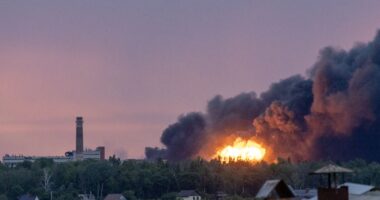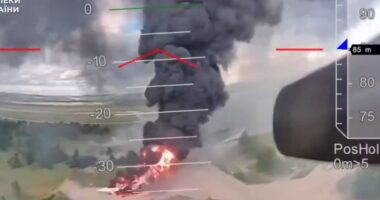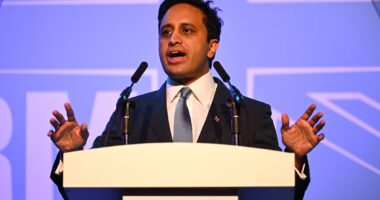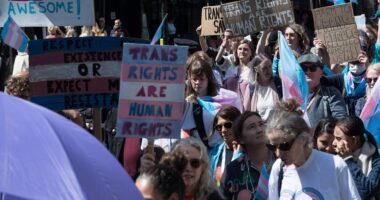
The former head of the British armed forces says Keir Starmer does not have enough troops to send to Ukraine to act as a peacekeeping force.
General Sir Nick Carter’s admission will pose a challenge for the prime minister, who recently expressed willingness to endanger British military personnel in order to safeguard the security of the war-torn nation.
Sir Nick delivered a grim evaluation of the UK’s military capabilities to defend against a potential assault from the Russian army led by Vladimir Putin, stating, ‘Currently, we lack the necessary equipment and personnel to achieve that.’
He highlighted that the British armed forces had suffered depletion as a result of what he labeled as three decades of neglect, as well as by relinquishing a substantial number of tanks and artillery pieces to Ukraine to support President Volodymyr Zelensky.
And in another bombshell, he said Britain’s military would not be able to protect the country if it were to come under the same air bombardment that Ukraine had suffered in the last three years.
Appearing on BBC’s Question Time last night, Sir Nick said Sir Keir would only be able to send troops to Ukraine as part of an ‘observer mission’ where they would ‘drive around in white vehicles’.
‘But if I suspect it will need to be a force that can deter Putin‘s aggression then fundamentally we are not equipped or manned to be able to do that at the moment,’ he said.
He said Britain’s military is ‘remarkably hollow’ and that the UK was ‘massively vulnerable at the moment’.
Sir Nick warned: ‘Whether we like it or not that means we are going to have to start protecting ourselves.
‘The sort of onslaught that Ukraine has suffered in the air via drones and missiles over the course of the last three years is unsustainable as far as the UK is concerned.
‘We might be able to park a Destroyer in the Thames to protect parts of London, but nothing more than that.’
He said Britain’s reliability on undersea cables for data, with 45 per cent of the UK’s gas supply coming from Norway, and 40 percent of food by sea has put the country in a vulnerable position.
Labour has set a target of spending 2.5 percent of GDP on defence by the end of this Parliament.
But Sir Nick says that needs to spent ‘now’ as ‘we are going to have to spend more money if we seriously believe that Putin is a threat to us in the future’.
The PM will next week fly to Washington to meet with US President Donald Trump to discuss a Ukraine peacekeeping plan.
According to sources, it will include fewer than 30,000 European troops to monitor any ceasefire deal Russia may agree to.
Starmer is due to visit the White House in the coming days and is expected to detail to the American leader an Anglo-French strategy for a ‘reassurance force’ made up of members of European militaries that would be placed far from the current frontlines.
This force would rely on ‘technical monitoring’, including intelligence, surveillance and reconnaissance aircraft, drones and satellites to provide a ‘complete picture of what is going on’, a Western official told the Telegraph.
The official added, however, that the peacekeeping force would be backed up by ‘enough firepower to monitor and shoot’ any Russian attacks down.
Naval patrol vessels would also be sent to the Black Sea to monitor Russian threats to the waters around Ukraine.
The plan falls significantly short of the 200,000 troops requested by Zelensky in the event of a ceasefire.
It comes after military analysts questioned how many troops Britain would actually be able to send to Ukraine.
Ben Barry, a senior fellow for land warfare at the International Institute for Strategic Studies think-tank, said the Army, which is expected to fall below 70,000 this year, could send an armoured brigade of up to 12,000 troops, but only for a year.
The former brigadier told The Times that the Army would struggle to send a whole regiment of tanks and other equipment because so many of its own spare parts and ammunition had already been given to Ukraine.
He said: ‘Because the size of the Army has reduced so much, the Army would struggle to sustain this force for more than a year.’

















